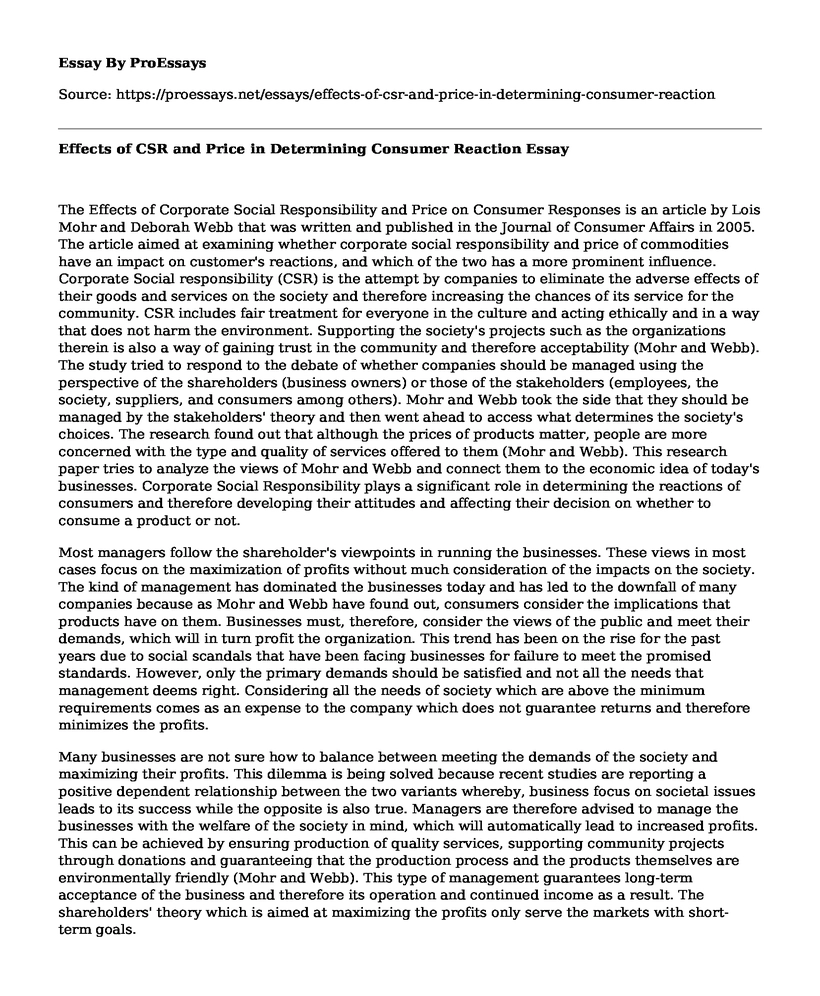The Effects of Corporate Social Responsibility and Price on Consumer Responses is an article by Lois Mohr and Deborah Webb that was written and published in the Journal of Consumer Affairs in 2005. The article aimed at examining whether corporate social responsibility and price of commodities have an impact on customer's reactions, and which of the two has a more prominent influence. Corporate Social responsibility (CSR) is the attempt by companies to eliminate the adverse effects of their goods and services on the society and therefore increasing the chances of its service for the community. CSR includes fair treatment for everyone in the culture and acting ethically and in a way that does not harm the environment. Supporting the society's projects such as the organizations therein is also a way of gaining trust in the community and therefore acceptability (Mohr and Webb). The study tried to respond to the debate of whether companies should be managed using the perspective of the shareholders (business owners) or those of the stakeholders (employees, the society, suppliers, and consumers among others). Mohr and Webb took the side that they should be managed by the stakeholders' theory and then went ahead to access what determines the society's choices. The research found out that although the prices of products matter, people are more concerned with the type and quality of services offered to them (Mohr and Webb). This research paper tries to analyze the views of Mohr and Webb and connect them to the economic idea of today's businesses. Corporate Social Responsibility plays a significant role in determining the reactions of consumers and therefore developing their attitudes and affecting their decision on whether to consume a product or not.
Most managers follow the shareholder's viewpoints in running the businesses. These views in most cases focus on the maximization of profits without much consideration of the impacts on the society. The kind of management has dominated the businesses today and has led to the downfall of many companies because as Mohr and Webb have found out, consumers consider the implications that products have on them. Businesses must, therefore, consider the views of the public and meet their demands, which will in turn profit the organization. This trend has been on the rise for the past years due to social scandals that have been facing businesses for failure to meet the promised standards. However, only the primary demands should be satisfied and not all the needs that management deems right. Considering all the needs of society which are above the minimum requirements comes as an expense to the company which does not guarantee returns and therefore minimizes the profits.
Many businesses are not sure how to balance between meeting the demands of the society and maximizing their profits. This dilemma is being solved because recent studies are reporting a positive dependent relationship between the two variants whereby, business focus on societal issues leads to its success while the opposite is also true. Managers are therefore advised to manage the businesses with the welfare of the society in mind, which will automatically lead to increased profits. This can be achieved by ensuring production of quality services, supporting community projects through donations and guaranteeing that the production process and the products themselves are environmentally friendly (Mohr and Webb). This type of management guarantees long-term acceptance of the business and therefore its operation and continued income as a result. The shareholders' theory which is aimed at maximizing the profits only serve the markets with short-term goals.
There are two parameters used to test the CSR, environmental and philanthropic. The environmental factors have a more significant impact in driving managers to adopt social responsibility than the benevolent element. Philanthropic CSR means free will willingness to commit resources to noble causes. Businesses are more pushed by environmental factors than the humanitarian, which implies that they are not yet willing to adopt Corporate Social Responsibility they are propelled by the urge to preserve the environment because it does not only affect the outside society but also it affects them directly.
The article by Mohr and Webb has both strengths and weaknesses. One of its advantages is that it is a result of in-depth research from previous researchers and also field research where consumers gave their feedback. The article has very many resources which can be used to verify the information written to prove its credibility. There is a weakness in the research in that its aimed at testing two variables; Corporate social responsibility and price. However, it focused more on the CSR and less on the cost of products. Price was neglected from the fieldwork all throughout the research. The imbalanced investment with the two variables could have contributed to biased results showing that CSR was more effective in determining consumers' responses. The article exhibits positive economic reasoning because the findings published in the article can either be approved or disapproved, through confirmation from the cited sources or through more research.
Work Cited
Mohr, Lois A., and Deborah J. Webb. "The effects of corporate social responsibility and price on consumer responses." Journal of Consumer Affairs 39.1 (2005): 121-147.
Cite this page
Effects of CSR and Price in Determining Consumer Reaction. (2022, Apr 14). Retrieved from https://proessays.net/essays/effects-of-csr-and-price-in-determining-consumer-reaction
If you are the original author of this essay and no longer wish to have it published on the ProEssays website, please click below to request its removal:
- Analysis of the Team Scenario
- School Improvement Plan: Florida School
- Management Practices of Leading Companies Paper Example
- My Product 'Poo Be Gone' Marketing Plan Paper Example
- Essay on Fathers Left Out of Paid Parental Leave: 40% of US Companies Offer Help
- Hansell's Theory for Unmet Human Needs: Attachments for Success - Essay Sample
- LVMH: World's #1 Luxury Brand - 75 Exceptional Houses, 5 Key Areas - Essay Sample







